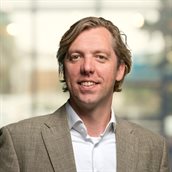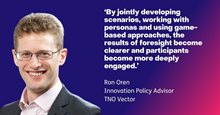The Dutch government is paying increasing attention to well-being in a broad sense. At the same time, earning capacity is still strongly associated with gross domestic product (GDP). As a result, the economic narrative continues to have a disproportionate influence on public policy and commercial activities. This makes it difficult to strike the desired balance between wealth and well-being. A new understanding of earning capacity helps us do this.
What is earning capacity?
Earning capacity is the ability to generate structural economic wealth and social well-being, now and in the future. This is the new definition proposed by TNO. Admittedly, that is harder to capture in the form of a number or statistic than the traditional definition of earning capacity.
Thijmen van Bree is a researcher and consultant working on economic issues at TNO. In his view this broader concept is a good fit with today’s more complex world: ‘There are a number of major transitions in progress and a lot is also changing in our country politically.’
‘Within TNO we are investigating how the Netherlands can continue to earn enough money and safeguard economic prosperity in 2040, but in such a way that the economy actually makes a positive contribution to social well-being and the well-being of individuals.’
Radically different choices
What if the government and businesses were to embrace this new definition of earning capacity? This would lead to radically different choices. After all, it would mean that all policy decisions and business activities would have to be consistent with the goal of well-being. You won’t manage that just by making little adjustments. We need new business models that help generate structural economic wealth as well as improving well-being.
To combine wealth and well-being in policies from now on, we not only require major investments in innovation, but also in education, training, and talent development. Besides that, we also need to define new growth paths and encourage entrepreneurs to follow them.
Tomorrow’s winners
So the bar has been set high. And so it should be, stresses Thijmen van Bree: ‘The key is to enable the Dutch economy and society to adapt to changing circumstances. This is crucial, as countries that organise their economies to allow their companies and organisations to respond to changes, transitions, and transformations in good time are and will continue to be successful.’
A different perspective on capital
To pull this off and pursue earning capacity, a combined effort is needed from the private and public sector, as well as capital, in various forms:
- Financial/economic capital
- Social capital
- Human capital
- Natural capital
To work on welfare and well-being now and in the future, you need more than just capital in the traditional sense – more than money, machines, and factories.
Without distinguishing between these four forms of capital, it is impossible to arrive at a new understanding of earning capacity. Not everything can be expressed in terms of financial/economic value. And we shouldn’t want to do so either.
Need for change
Given all the uncertainties in today’s world, it is tempting to stick with current policies. In itself, that is understandable. However, there is a good chance that these challenges and uncertainties will only become greater with time. Van Bree: ‘There really is a need for change, and that realisation has also dawned in the Netherlands.’
‘When deciding whether or not to seize economic opportunities, more attention is often already being paid to the extent to which an economic activity is future-proof. And at TNO we think it helps to use a new interpretation of earning capacity that is linked to the pursuit of well-being.’
To exploit economic opportunities sustainably, we need to pay more attention to future-proofing economic activities. At TNO we are therefore keen to update the concept of earning capacity and link it to the concept of well-being.
Towards a future-proof Netherlands
The great thing is that a new perspective also brings new opportunities. The same goes for the new concept of earning capacity. By applying it, we can build on the Netherlands’ strengths and also take future generations into account.
If we manage to translate this into economic activities that help solve major social challenges, the Netherlands really will become a different country – in a positive sense.



